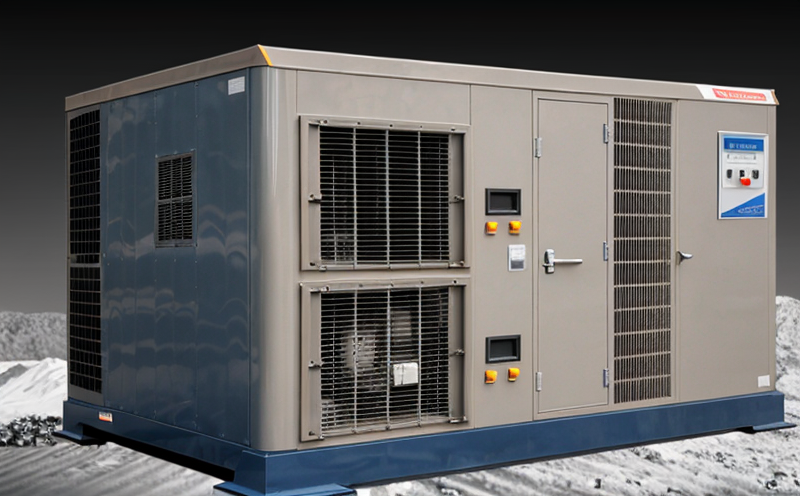ASTM D648 Heat Distortion Temperature Testing
The ASTM D648 standard defines a method to determine the heat distortion temperature (HDT) of plastics. This property is crucial for understanding how materials will perform under thermal stress, which is essential in semiconductor and microchip manufacturing where the integrity of materials must withstand high temperatures during processing.
Heat distortion occurs when a material begins to deform permanently at a certain temperature, usually below its melting point. In semiconductor fabrication, this test ensures that the packaging materials used can maintain their structural integrity under thermal stress without compromising performance. This is critical for ensuring reliability and longevity of microchips in various applications.
The ASTM D648 HDT testing involves placing a specimen in a controlled environment where it is subjected to increasing temperature and load until permanent deformation occurs. The temperature at which this happens is recorded as the heat distortion temperature. This test can be performed on different types of specimens, including films, sheets, rods, and molded parts.
The equipment used for this testing includes an ASTM D648 HDT machine, which is designed to apply a specified load to the specimen while maintaining it in a constant temperature environment. The machine typically has a heated stage that can maintain temperatures up to 200°C or higher, depending on the required test conditions.
The specimen preparation for ASTM D648 testing involves cutting samples from the material being tested into standard dimensions and shapes. For this service, we use precision cutters to ensure uniformity across all specimens. The specimens are then placed in a fixture that applies a specified load (usually 1.8 kgf/cm²). It is important to note that the exact conditions can vary based on specific ASTM D648 requirements which may include different loads or specimen sizes.
The testing process involves gradually increasing the temperature of the specimen while maintaining a constant load until permanent deformation occurs. The temperature at this point is recorded as the heat distortion temperature (HDT). This test not only provides critical data for material selection but also helps in optimizing manufacturing processes to ensure quality and reliability.
Understanding HDT is vital for semiconductor manufacturers because it directly impacts the performance of microchips under high temperatures. For instance, during the assembly process, microchips are subjected to soldering which involves high temperatures. If the packaging material does not have an adequate HDT, it may deform or melt, leading to poor contact and potential failure.
By conducting ASTM D648 heat distortion temperature testing, semiconductor manufacturers can ensure that their materials meet the required standards for performance under thermal stress. This test is particularly important in ensuring the reliability of packages used for microchips in various applications such as automotive electronics, consumer devices, and industrial equipment.
Scope and Methodology
The ASTM D648 standard specifies a method to determine the heat distortion temperature (HDT) of plastics by subjecting specimens to increasing temperatures under specific loading conditions. The primary goal is to evaluate how materials will behave when exposed to thermal stress, which is essential in semiconductor manufacturing where material integrity must be maintained.
The scope of ASTM D648 testing includes various types of plastic materials commonly used in the semiconductor industry such as polycarbonate (PC), polyetherimide (PEI), and acrylonitrile butadiene styrene (ABS). The test is conducted on specimens that are cut to standard dimensions, ensuring consistency across all samples.
The methodology involves placing these specimens in a controlled environment where they are subjected to increasing temperatures while maintaining a constant load. The temperature at which permanent deformation occurs is recorded as the heat distortion temperature. This process allows for a precise measurement of how materials will behave under thermal stress during manufacturing and use.
- Specimens cut to standard dimensions
- Heated stage maintained at specified temperatures up to 200°C
- Application of a constant load (1.8 kgf/cm²)
- Gradual increase in temperature until permanent deformation occurs
The test results provide critical data that helps manufacturers optimize their processes and ensure the quality and reliability of materials used in semiconductor manufacturing. It is particularly important for ensuring the integrity of microchip packaging under high temperatures.
Benefits
- Evaluation of material performance under thermal stress
- Safety assurance for semiconductor manufacturing processes
- Enhanced reliability and durability of packaged microchips
- Precision measurement ensuring consistent quality
- Optimization of manufacturing processes to meet required standards
- Selecting appropriate materials that can withstand high temperatures without deforming or melting
- Improving product performance by ensuring integrity during thermal stress conditions
Customer Impact and Satisfaction
- Higher levels of customer satisfaction through reliable products
- Increased trust in the quality of materials used in semiconductor manufacturing
- Prompter resolution of issues related to material performance under high temperatures
- Better alignment with industry standards ensuring compliance
- Enhanced reputation among customers for providing quality services and products
- Faster product development cycles due to accurate testing results
- Reduced risk of product failure in harsh environmental conditions





